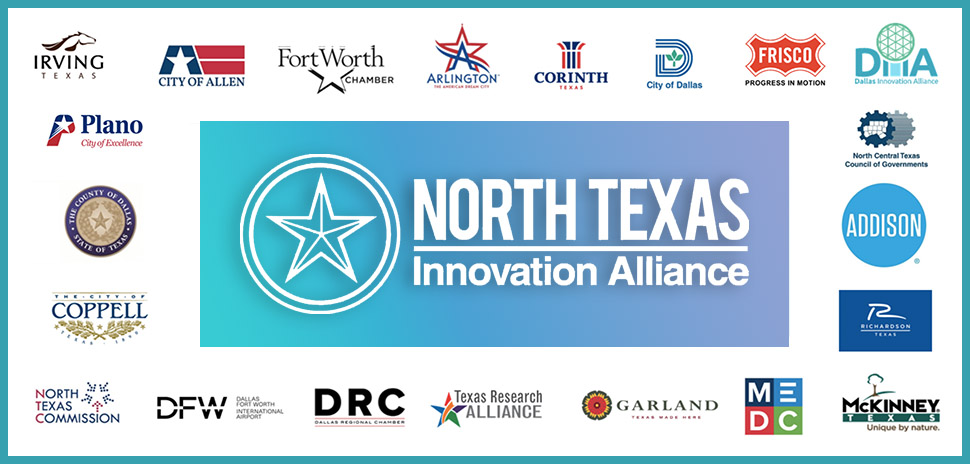![]() Trey Bowles and Jen Sanders, the co-founders behind the Dallas Innovation Alliance, have launched a new regional “smart city” initiative. And this time around, they’re “coming for everybody.” The duo has convened 21 North Texas stakeholders—so far—to work together to build “the most connected, smart, and resilient region in the country.” The brand new consortium will be called the North Texas Innovation Alliance (NTXIA).
Trey Bowles and Jen Sanders, the co-founders behind the Dallas Innovation Alliance, have launched a new regional “smart city” initiative. And this time around, they’re “coming for everybody.” The duo has convened 21 North Texas stakeholders—so far—to work together to build “the most connected, smart, and resilient region in the country.” The brand new consortium will be called the North Texas Innovation Alliance (NTXIA).
The nonprofit NTXIA, a 501(c)3 consortium, was launched to improve quality of life, promote inclusive economic development, and increase resource efficiency.
“These are big, meaty challenges, and it takes more than a village,” Sanders says. “It takes all of us: It takes a region.”
And, she adds, “we’re ready to rumble.”
Through data, technology, and community, the group of cross-sector innovators will establish strategic advisory committees to collaboratively tackle issues in the North Texas region. Topics include data standards and privacy, cybersecurity, digital inclusion, financial models, and procurement.
The NTXIA is the largest initiative of its kind in the country, according to Sanders. That’s based on the region’s geography boundaries and population.
“It is NTXIA’s belief that pressing challenges can only be solved through best minds approaches, and can be addressed more quickly together than those developed individually,” Trey Bowles, who is also co-founder and executive chairman of The DEC Network, wrote in an email. “At times like these, it is more important than ever for cities, counties, municipalities, and agencies to come together and design and implement innovative solutions to secure our futures during times of crisis.”
It’s not a new effort for Bowles, who built the Dallas Entrepreneur Center from the ground up and had a large hand in launching the Dallas Innovation Alliance to build a smart cities strategy with the City of Dallas. The first project the DIA worked on was the Smart Cities Living Lab in Dallas’ West End. The NTXIA is really a scaling of that model that was established.
Along with the DIA, founding members of NTXIA include: Addison, Allen, Arlington, Coppell, Corinth, Dallas County, Dallas Fort Worth International Airport, Dallas Regional Chamber, Fort Worth Chamber of Commerce, Frisco, Garland, Irving, McKinney, McKinney Economic Development Corporation, North Texas Commission, North Texas Council of Governments (NCTCOG), Plano, Richardson, and the Texas Research Alliance.
NTXIA has been in development since December, when Sanders and Bowles convened an initial group.
“From the level of interest and enthusiasm, as well as the interactivity of the discussion, from the very first meeting, it was really clear that there was a hunger for this type of collaboration,” Sanders says.
Then COVID hit.
A planned convening in March was scheduled for the day that the Dallas shelter-in-place went into effect. While Sanders feared a low turnout, “instead, we had 18 entities join on the day of the shutdown.”
The virus gave the group an immediate tactical piece to work on, while the NTXIA looks ahead to mid- and long-range focus areas.
“As a group, we ask ‘What are the five biggest challenges or problem statements facing the region,” Sander says, “We design projects to test in those five areas, opening up for idea generation and submissions, then move toward execution.”
Sanders plans for deeply vertical strategic advisory committees in these focus areas. “Big topics need a dedicated forum to come together,” she says. Much like a mini think tank, the committees will use outside experts and subject matter experts to help look at crafting solutions.
In informal discussions, focus areas under consideration include infrastructure, citizen engagement, education, the digital divide, human capital, resource efficiency, resiliency, emergency preparedness, and public safety, Sanders says.
“I would be shocked if transportation wasn’t a heavy focus,” she adds.
It’s also critical to collectively solve for the “meatier policy-driven challenges that often hold large initiatives back,” according to Sanders. She points to things like data privacy, data standards procurement, and financial.
Both Sanders and Bowles emphasize that the power of NTXIA is in its regional approach. In leveraging resources, building connections, and sharing best practices, the leaders believe cross-jurisdictional solutions can be established throughout North Texas.
That idea for a regional group was always clear, Sanders says. In DFW, particularly, the geographic boundaries are permeable and many people don’t live and work in the same county.
“Smart city collaboration is now moving beyond municipal boundaries, with more and more regions working together in order to create seamless interchanges for their residents,” Sanders says.
She says everyone benefits from the North Texas region working collectively to create the most compelling and innovative solutions to support government, residents, and businesses.
“The opportunity is for everyone,“ Sanders says. “We have to work together and leverage each other for the sustainability of the region and to provide the infrastructure that is prepared to collaborate to respond with agility in times of crisis.”
Sanders and Bowles set about understanding how they could leverage the collective expertise and the projects that each entity had worked on to be sure nobody was “reinventing the wheel.”
The North Texas Commission (NTC) played a large role in establishing the consortium, according to the group’s announcement. The NTC hosted early convenings of its membership that helped shape NTXIA’s mission.
At its heart, the organization is about uniting ideas and best practices. The NTXIA wants to leverage resources from both a financial and a human bandwidth standpoint, according to Sanders. That’s especially important right now, coming out of the pandemic, when we will need to “be able to do more with less.”
The goal? To benefit all citizens. It’s important that the community is involved and engaged, she says.
Now, that the NTXIA has launched, Sanders says she hopes to hire five folks for key roles in the near term.
NTXIA will also join Mastercard’s City Possible network, an initiative that brings cities, companies, and communities together to co-develop solutions that advance inclusive and sustainable urban development. City Possible will give NTXIA access to Mastercard’s expertise, data, and partnerships.
“Since its inception, City Possible was always designed to become a network of networks and we are already seeing that come to fruition in 2020,” Miguel Gamino, executive vice president of Enterprise Partnerships and head of Global Cities, said in a statement. “By bringing their consortium of cities to the network, we will help the regions represented by NTXIA tap into the insights and resources of the global community and accelerate local collaboration to deploy solutions at scale.
“We have a lot of resources and experts to tap,” Sanders says. “You know, we as a region are really blessed.”
![]()
Get on the list.
Dallas Innovates, every day.
Sign up to keep your eye on what’s new and next in Dallas-Fort Worth, every day.






























